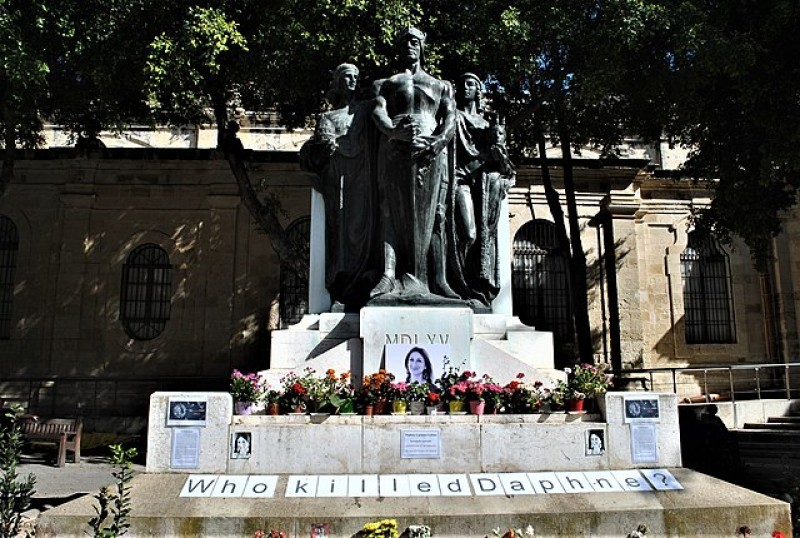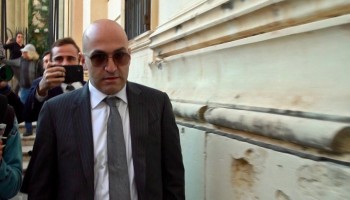Caruana Galizia was killed in October 2017 Witnesses claim that the explosion ripped her car into pieces and threw her body onto a neighboring field not far from her home.
Lawmakers noted Malta’s progress during a discussion about the rule of law, organized crime and corruption on the island but suggested that more needs to be done.
“In its resolution adopted with 564 votes in favour, 10 against, and 17 abstentions on Thursday, Parliament acknowledges the progress in ongoing judicial proceedings, and the Maltese Prime Minister’s public apology for the state’s shortcomings that could have contributed to the Daphne Caruana Galizia murder,” the Parliament said in a statement.
In what the Times of Malta news outlet described as “a sensational twist to the five-year case,” two brothers accused of murdering Daphne Caruana Galizia have admitted to the charges last week, barely hours into the trial.
Alfred, 57, and George, 59, Degiorgio, reportedly agreed to reverse their 'not-guilty' plea in exchange for a more lenient sentence. Both pled guilty to all six charges and were sentenced to 40 years in jail each, according to the report.
The third man implicated in the murder, Vincent Muscat, was sentenced to 15 years in prison, after admitting to the charges in February last year.
Members of Parliament, however, expressed grave disappointment that the inquiry into Galizia’s killing resulted in only three convictions. They insisted that everyone involved, at every level, should be brought to justice, and stressed that “the full and continuous involvement of Europol” is needed.
The court also ruled last week that each of the Degiorgios pays 43,000 euro (US$42,328) in costs within three years, as well as seize the equivalent of about 50,000 euro ($49,220) in illegal gains.
If they behave well, the brothers may be freed from jail after less than 25 years.
Malta’s Prime Minister Robert Abela commended the conviction in the Caruana Galizia case, describing it as “an important step forward, to deliver justice in a case that represents a dark chapter in Malta’s history.”
Abela reiterated the “government’s commitment to deliver full justice to the Caruana Galizia family, and to the Maltese people.”
Although he promised that his government would “continue implementing important reforms to strengthen further the rule of law principles and democracy in Malta,” members of the European Parliament said they are “appalled by the lack of progress in prosecuting the high-level corruption and money laundering that Daphne Caruana Galizia had been investigating.”
They expressed their concern over the “length and inefficiency of investigative and judicial proceedings; allegations of money laundering and corruption; the relatively low number of cases referred to the European Public Prosecutor’s Office (EPPO) and the reported lack of cooperation from Maltese authorities.”
The European parliamentarians also criticized the impunity afforded to former Prime Minister, Joseph Muscat, his Chief of Staff, Keith Schembri, and the former Minister for Tourism, Konrad Mizzi.
Maltese media reminded that with the brothers’ admission, four persons have now gone clean about their involvement in Caruana Galizia’s murder – the two brothers, their collaborator Vince Muscat, and the admitted middleman Melvin Theuma.
Theuma has claimed that the murder was ordered by tycoon Yorgen Fenech, the casino magnate said to be behind 17 Black, a shadowy Dubai corporation, and director and co-owner of Electrogas — the winner of a multi-million euro Maltese government contract in 2013 to build a new gas power station on the Mediterranean island.
Fenech, who denied the charges, and who is yet to stand trial, was arrested in November 2019, while attempting to leave the country on his yacht.
Schembri and Mizzi have been linked to Fenech and his 17 Black, which, according to the Panama Papers leak, had been listed as a target client of their Panama offshore companies.
Prior to her death, Caruana Galizia wrote about 17 Black, alleging that it was connected to Maltese politicians – claims that many speculate could have lead to her murder and alleged cover-up by high-ranking Maltese politicians and public officials.






